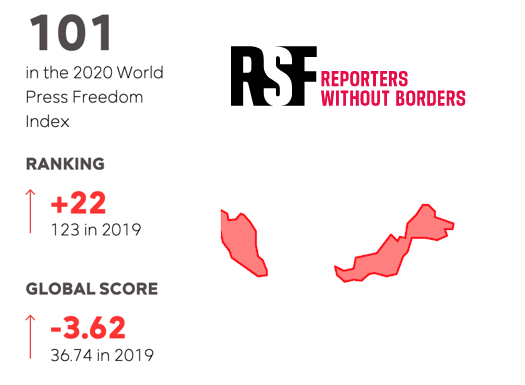Malaysia (101st) and the Maldives (79th) have registered the biggest rises in the 2020 World Press Freedom Index, due to the beneficial effects of changes of government through the polls.
The latest Reporters Sans Frontieres index sees Australia’s international reputation for good journalism taking a hit, due to the police raids on the ABC and Annika Smethurst, dropping Australia five places down its ranking for media freedom.
In Malaysia, journalists and media outlets that had been blacklisted, such as the cartoonist Zunar and the Sarawak Report investigative news website, have been able to resume working without fear of harassment, according to RSF. The country moved up 22 places in the world ranking for media freedom, giving the country increased credibility in its media sesctor.
The general environment for journalists is much more relaxed, self-censorship has declined dramatically and the print media are now offering a fuller and more balanced range of viewpoints, including support for the new ruling coalition, and support for the old ruling coalition, now in opposition. The new government has kept its promise to repeal the Orwellian provisions of the anti-fake news law adopted by the outgoing government.
But the authorities still have a draconian legislative arsenal with which to suppress media freedom, an arsenal that includes the 1948 Sedition Act, the 1972 Official Secrets Act and the 1998 Communications and Multimedia Act. Under these laws, which need a complete overhaul, the authorities have strict control over publication licences and journalists can be sentenced to 20 years in prison on sedition charges. They pose a constant threat to media personnel, who still cannot express themselves with complete freedom, despite all the progress
The Maldives has moved up 19 places in the report since the 2018 election, which saw a change of government.
Parliament repealed the draconian 2016 law on defamation, which had been widely used by the previous government to harass independent media outlets, especially Raajje TV, which had to pay a total of 215,000 euros in fines for allegedly defaming Yameen.
Police violence against journalists increased sharply during the first half of 2018. The situation has since improved, but impunity is still a major issue.
The RSF report on Australia says:
In 2019, Australian journalists became more aware than ever of the fragility of press freedom in their country, whose constitutional law contains no press freedom guarantees and recognizes no more than an “implied freedom of political communication.”
Federal police raids in June 2019 on the home of a Canberra-based political reporter and the headquarters of the state-owned Australian Broadcasting Corporation in Sydney were flagrant violations of the confidentiality of journalists’ sources and public interest journalism. “National security,” the grounds given for these raids, is used to intimidate investigative reporters.
They also have to cope with a 2018 defamation law that is one of the harshest of its kind in a liberal democracy, and terrorism laws that make covering terrorism almost impossible… [The] oligarchic media model, in which media outlets focus above all on cost-cutting and profits, constitutes an additional curb on public interest investigative journalism. The situation became even worse in early 2020 when the Australian Associated Press, the country’s only national news agency, ceased operating after 85 years because it was deemed insufficiently profitable by its two main shareholders, News Corp and Nine Entertainment.
RSF says the Covid-19 pandemic is “highlighting and amplifying the many crises that threaten the right to freely reported, independent, diverse and reliable information.”
The 2020 edition of the Index, which evaluates the situation for journalists each year in 180 countries and territories, suggests that the next ten years will be pivotal for press freedom because of converging crises affecting the future of journalism:
- a geopolitical crisis (due to the aggressiveness of authoritarian regimes);
- a technological crisis (due to a lack of democratic guarantees);
- a democratic crisis (due to polarisation and repressive policies);
- a crisis of trust (due to suspicion and even hatred of the media);
- an economic crisis (impoverishing quality journalism)…
- and now a global public health crisis.
At the same time, the International Press Institute has warned that some governments in Europe are “increasingly taking advantage of emergency legislation aimed at tackling the coronavirus to push through restrictions which seriously erode press freedom.”
According to data collected by the International Press Institute, over the past few weeks “an alarming number of European governments, especially in eastern and central Europe,” have used the ongoing health crisis as a pretext to restrict the free flow of information and clamp down on independent media.
The most serious threats have so far been observed in states with authoritarian tendencies such as Hungary and Russia, where the pandemic has been exploited to grab more powers and tighten control over information.
The Public Media Alliance is urging governments not to misuse the coronavirus pandemic. Last month, the Public Media Alliance called on governments to not use the coronavirus pandemic as an excuse to curtail media freedom and the ability of journalists to hold power to account.
Since then, “a crescendo of calls have been made by media freedom advocates worldwide reiterating the fact that access to accurate, fact checked and critical information is absolutely essential in the fight against COVID-19.” It is feared that the pandemic is being used by many administrations as a reason to crack down on journalists and implement sweeping restrictions on the right to access information, free expression and a free media under the guise of tackling so-called ‘fake news.’
Subscribe to our daily flash briefing podcast on these platforms: Acast, Apple iTunes Podcasts, Podtail, Spotify, Google Podcasts, TuneIn, or wherever you get your podcasts.

